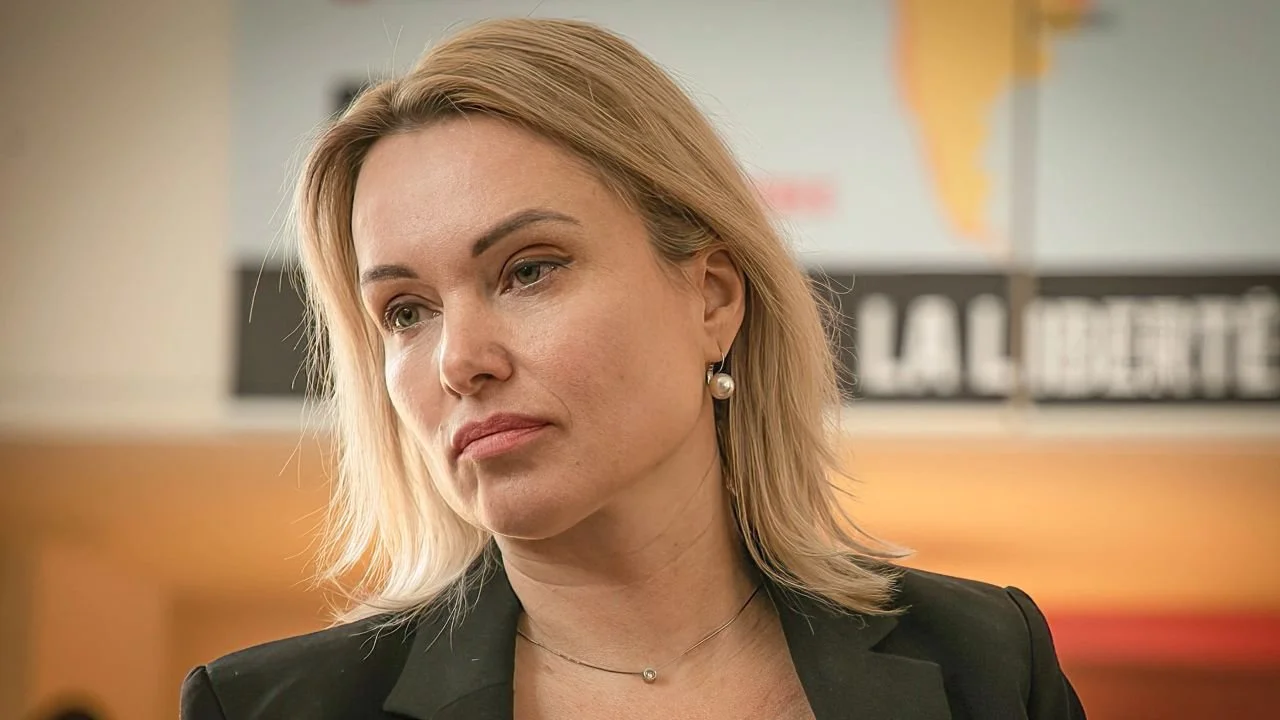Russia: Marina Ovsyannikova Sentenced to 8.5 Years in Absentia for Protesting Outside Kremlin
Journalist known for protesting war live on state-run TV is living in exile in France
Location: Russia, Moscow
Date: October 4, 2023Update: March 28, 2024Moscow court convicts former state TV editor Marina Ovsyannikova of spreading “false information” about the Russian military. Currently living in exile in France, she was sentenced to eight and half years in absentia. The Coalition For Women In Journalism has been worryingly monitoring the rise in press freedom violations committed by Russia. It currently accounts for almost 20% of all violations against women journalists in Europe during the first half of 2023, as documented by CFWIJ. We denounce the sentencing of Ovsyannikova, the latest in a series of attacks on the media since the country invaded Ukraine, and demand Russia stop targeting press critical of its war with draconian military censorship laws.
“This is just fake justice because, you know, in Russia, we don’t have independent courts, Putin destroyed all independent courts,” says journalist Marina Ovsyannikova, dismissing her sentencing as politically motivated.
On October 4, 2023, Moscow’s Basmanny District Court sentenced Ovsyannikova to eight and a half years in prison. In March 2024, Ovsyannikova’s appeal against the conviction was rejected; the initial verdict is now in force. The journalist will have to serve her sentence either upon her return to the country or through extradition proceedings.
“This is just fake justice because, in Russia, we don’t have independent courts”
Ovsyannikova was put under house arrest in August 2022 for spreading “false information” about Russia’s military after she protested outside the Kremlin with a poster saying: "How many more children must die [in Ukraine] before you stop?"
Ovsyannikova escaped house arrest earlier this year with her child and is living in exile in France. She was sentenced in absentia.
Ovsyannikova gained worldwide attention in March 2022 when she interrupted a live broadcast on Russia’s state-controlled Channel One station, holding a poster proclaiming “No to War.” The journalist, who worked as an editor at the channel, was detained and fined for her act of protest.
At her trial in Moscow, Ovsyannikova says her relatives testified against her. “They gave evidence against me in the court, and I was shocked when I read about it,” lamented the former television editor.
Ovsyannikova says her childhood experience growing up in Grozny, fleeing Chechnya when it was bombed in the first Chechen war, motivated her to protest publicly against Putin’s invasion of Ukraine.
“My house was destroyed during the Russian operations there, and we fled with my family, with all the refugees, with no possessions, with nothing,” explains the journalist. “I imagined the Ukrainian women having to live through that.”
“I imagined the Ukrainian women having to live through that”
She also took a stand on live TV to “burst the propaganda bubble” created by state-controlled and Kremlin-dictated media channels in Russia. Since escaping to Europe, the journalist has published a book about the mechanisms and methods of control used by the state propaganda outlet she worked for in Russia.
The military censorship law banning people from discrediting Russia’s armed forces was introduced after the country’s full-scale invasion of Ukraine in 2022. Those deemed to have broken the law can be imprisoned for up to 10 years. It aims to silence those who publicly challenge the Kremlin’s narrative of the conflict. It is used to go after Russian journalists and activists, inside and outside Russia, who speak publicly or post on social media about the army’s acts of aggression in Ukraine.
The Kremlin has also imprisoned journalists for “discrediting” its military. In February, Siberian journalist Maria Ponomarenko was charged and is currently serving a six-year prison sentence for a post she made about civilian deaths after the Russian bombing of the Ukrainian city Mariupol.
Russian courts have also sentenced several other women journalists in absentia. Last month, Ukrainian television presenter Maria Efrosinina was given a seven-year prison sentence in absentia for discrediting Russia’s military for a social media post. Earlier this year, Russian food blogger Veronika Belotserkovskaya was sentenced to nine years in absentia, charged with spreading "fake" information about the military after an Instagram social post.
The Coalition For Women In Journalism denounces the absurd and harsh sentencing given to Marina Ovsyannikova and worries for her safety. Recent cases involving suspected poisonings of exiled Russian journalists and surveillance of women journalists who continue to report outside Russia means Ovsyannikova must receive adequate protection in her new home country. We urge French authorities to take any threats against Ovsyannikova seriously and ensure she and her child are safe. The Coalition For Women In Journalism further vehemently condemns Russia’s media crackdown and demands that all journalists imprisoned under its military censorship law be immediately released.
The Coalition For Women In Journalism is a global organization of support for women journalists. The CFWIJ pioneered mentorship for mid-career women journalists across several countries around the world and is the first organization to focus on the status of free press for women journalists. We thoroughly document cases of any form of abuse against women in any part of the globe. Our system of individuals and organizations brings together the experience and mentorship necessary to help female career journalists navigate the industry. Our goal is to help develop a strong mechanism where women journalists can work safely and thrive.
If you have been harassed or abused in any way, and please report the incident by using the following form.


